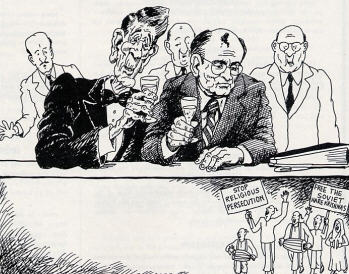When Mikhail Gorbachev's government ran an ad campaign in the Wall Street Journal inviting Western corporations to do business in the Soviet Union, many Americans became convinced about his commitment toglasnost, his openness policy. This action of Gorbachev's, along with his seemingly greater enthusiasm than America's President for a solution to the nuclear arms race, has won him kudos in the West.

But Ronald Reagan not to be outdone by his rival has a new strategy for dealing with the Soviets: joking. In place of his usual heavy rhetoric against Moscow, he now tells jokes lampooning life under the hammer and sickle. The practice allows him to point up differences between the Russian and American societies, but without a harsh or antagonistic edge.
One joke Mr. Reagan enjoys telling is about the man who goes to a state agency in Moscow to buy a car. After the deal is settled, the buyer asks when he can expect delivery on the car.
"You can take delivery in exactly ten years," comes the reply.
"Good. And will I have it in the morning or the afternoon?" asks the anxious buyer.
"What will it matter ten years from today whether you get your car in the morning or the afternoon?" queries the state official.
"Well," the buyer says, "the plumber's coming that morning."
A White House aide said Mr. Reagan's joke-telling reflects his genuine sympathy for the Russian people, who he believes are getting a raw deal from their government.
The Hare Krsna devotees in Russia can attest to that. Glasnost has not opened to them yet. Twenty-three devotees have been locked up on false charges and subjected to various forms of psychiatric abuse because of their practicing Krsna consciousness. Under those circumstances, I imagine they must on occasion long for a system where they could practice the religion and life-style of their choice without official harassment, as we are able to do in America.
Nevertheless, a Krsna conscious Russian, being a transcendentalist, would look upon Mr. Reagan's oblique pointing to Russia's foibles as an instance of the pot calling the kettle black. A transcendentalist would not just look at the material disparities between the two nations and agree that one nation is so much better off than the other. That would be folly to him, like saying a heap of wet dung is better than a heap of dry dung, when, in point of fact, it's all dung.
A Krsna conscious transcendentalist sees that everyone in this world is getting a raw deal, but the rawness is not defined by how slowly the plumber or the new car comes. The rawness stems from ignorance.
Though they will rarely admit it, most people don't know the actual standard of human progress and happiness; consequently, they don't know the standard of good government either. That's why they place a higher value on the trivial achievements of one nation over another: speedier car delivery, a better phone system, one-stop supermarkets, bigger and better bombs and weapons.
Ignorant of the unique opportunity of human life the chance to transcend the body and taste the happiness of the soul people imagine that material amenities will solve the problems of life, when in fact they keep people in ignorance. Both the difficulties of waiting for a car in Russia and the ease and speed of acquiring one in America keep people in ignorance by distracting them from introspection that may lead to self-realization.
In either case the result is the same: People squander their human life and die ignorant of their full potential. A saintly transcendentalist sees, therefore, that ignorance is the problem everywhere.
The solution is knowledge not material knowledge, but spiritual knowledge, which governments should provide. Instead materialistic governments keep their people in ignorance. By giving undue emphasis to nationalism, leaders distract people from the real problem. The people mistakenly place higher value on mundane achievements and conclude that one government is giving a raw deal but another one isn't.
A transcendentalist, on the other hand, sees that all versions of materialism whether theistic consumerism or atheistic communism are based on exploiting the planet's resources for sense gratification, and thus create a hellish condition for human society.
This brings to mind another joke Mr. Reagan is fond of telling, about the American who makes acquaintance with a Russian while on a visit to Moscow. Inevitably, the two start comparing countries.
"In America," the tourist says, "I can stand in front of the White House and yell, 'To hell with Ronald Reagan,' and nothing would happen to me."
"Well," comes the reply, "here in Moscow I can stand in front of the Kremlin and shout, 'To hell with Ronald Reagan,' too, and nothing would happen to me either."
Of course, no devotee would wish that fate on Ronald Reagan or anyone else. Yet a devotee, whether Russian or American, would ask, "What does it profit a nation if it gains the whole world but suffers the loss of its citizens' souls?"
